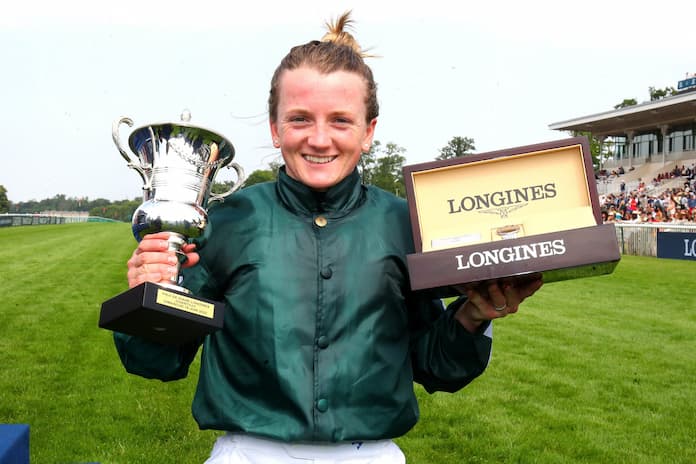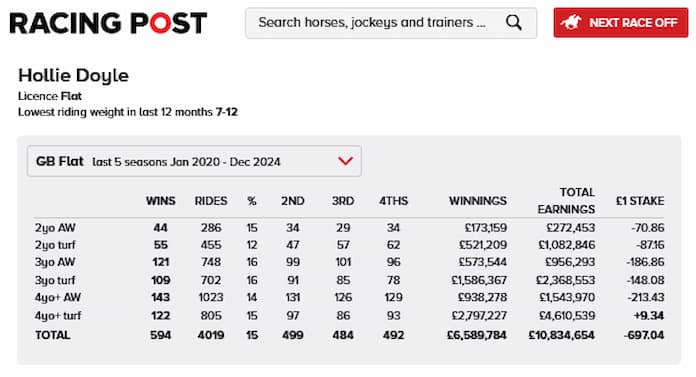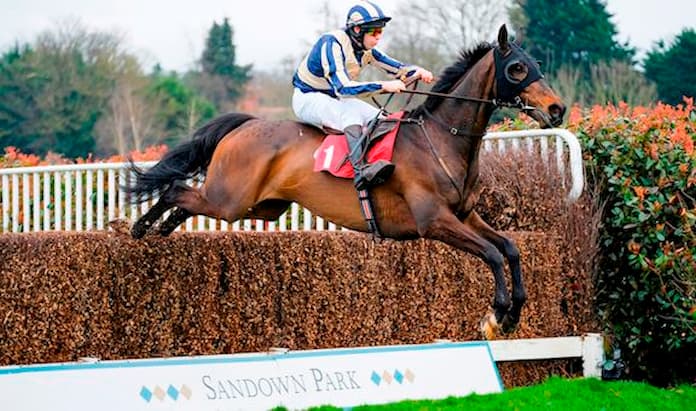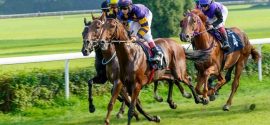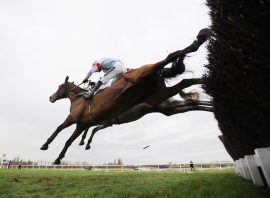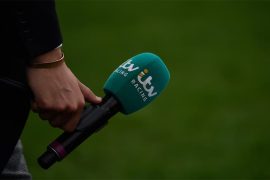How much do jockeys earn per ride in the UK? Is an interesting question that horse racing fans might be keen to know as the top riders can often be seen turning up to the races in flashy sports cars, planes or helicopters. While it’s also no secret those at the other end of the spectrum some jockeys are seen hunting around from day to day trying to make ends meet.
How Much Do Jockeys Earn Per Ride?
The good news for jockeys is that it doesn’t matter if you are a journeyman (or woman) rider that only takes up one mount a day, or a high-flyer like Frankie Dettori – as all jockey riding fees are the same.
A professional horse racing jockey will earn £157.90 (flat) or £214.63 (jumps) per ride. While if a jockey has been booked to ride a horse and it doesn’t run, they will still receive 50% of this riding fee.
Of course, there is tax to pay on these jockey riding fees. But if you quickly do the maths – a jump jockey that has four rides in an afternoon can rack-up a tidy £858.52 in riding fees.
While these can also be topped-up if they get any winners (or places), more on that below.
What about the jockey riding fees for apprentices and conditionals?
These are, of course, less experienced riders that are still learning their trade. As a result, they are paid slightly differently, with flat apprentices getting 80% of the pro fee – £126.32.
However, conditional jumps riders do get the same as their aspired fully-fledged pros.
All jockey riding fees in the UK are negotiated each year by the Professional Jockeys Association (PJA) and the Racehorse Owners Association (ROA).
Jockey Riding Fee Breakdown
- Flat: £157.90 (per ride)
- Jumps: £214.63 (per ride)
How Much Of The Prize Money Do Jockeys Get?
A jockey’s riding fee is set in stone – no matter if they win, lose or fall at the first.
But they can also quickly super-charge their ‘set-in-stone’ fees with the incentive of winning races.
Each jockey will also get a percentage of the winning and place prize money and with races like the Grand National worth £500k this can be a tidy sum for the successful jockey.
The percentage winning split depends on the type of race. But the rough guide here is that flat jockeys will get 8.5% of the win prize money and 2.61% of any place winnings.
While a jump jockey will recieve approx. 11.03% of the winning prize and 3.44% of the place.
Sticking with the Grand National example – this means with the winning horse/owner getting £500,000, the 2023 jockey Derek Fox banked around 11% of this, which was a cool £55,000.
Oh, and don’t forget Fox’s £214.63 riding fee!
Of course, the rest of any prize money won will go to the horse’s owner, plus the trainer will also get a percentage (similar to the jockey).
Prize Money Breakdown (Approx)
- Win (Flat): 8.5%
- Win (Jumps): 11.03%
- Place (Flat): 2.61%
- Place (Jumps): 3.44%
WATCH: Jockey Derek Fox Banking Approx £55k For Winning The 2023 Grand National
A Look At Hollie Doyle’s Riding Figures (2020-2024)
For the jockeys at the top of their profession, you can see how quickly their earnings can catapult.
If we look at Hollie Doyle’s riding stats from the last five years (2020 to 2024), you can see below she’s had a monster 4,019 rides in the UK and won 594 races with £6,589,7984 in winning prize money banked.
Let’s take a rough look on what Doyle earned during this period based on today’s figures. These also don’t include any place winnings.
- Riding Fee: £157.90 x 4019 rides = £634,600.10
- Winning Percentage: 8.5% of winning prize money of £6,589,784 = £560,131.64
- Total Earnings: £1,194,731.74
Note: These approx. figures are based on the jockey riding fees today so may have been slightly less in 2020
Jockey Earnings Can Be Topped Up With Sponsorship Deals
In addition to the riding fees and any winning percentages some jockeys can also secure themselves sponsorship deals.
These can be logos on breaches worn or on the cars they might drive to the races and are more often than not industry related companies like bookmakers.
Hollie Doyle is sponsored by Sky Sports Racing, while Hayley Turner has sponsorship links with bookie BetGoodwin.
Jockey Retainer Fees
Most jockeys fall into two riding categories. They are either attached to a yard as their stable jockey and will get the bulk of their rides. While others are freelance and will float around with different owners and trainers. With rides booked by an agent.
For example, when he rode Ruby Walsh was stable jockey to Paul Nicholls and then Willie Mullins – riding all their top horses over the years.
The top jockeys are also often snapped up by the big owners that prefer to have all their horses ridden by one jockey. William Buick, who is the number one rider for Godolphin, is an example of this and are called ‘retained jockeys’.
Sticking with Hollie Doyle, she is also retained by top owner Imad Alsagar, who has famous horses like Group One winner Nashwa.
What Are A Jockey’s Main Expenses and Deductions?
Of course, all jockeys will have to pay tax on any earnings but there are many other expenses and deductions that riders must fork out for.
If a jockey (and most do) have an agent, then they will need paying for helping them get rides in the first place. Agents command around 10%. Plus, round 3% also goes to the PJA for membership of the jockeys’ union.
There is also a valet that needs paying as these will be responsible for cleaning and managing a jockey’s equipment at the track. Their fee is worked out as 10% on their first ride of the day, then 7.5% for their second and 5% of their third.
Jockeys also have to pay for travel to the races – often petrol, or if a top jockey, then maybe helicopter or plane fees. While there is also insurance and physios (if injured) and fees to have a Weatherbys bank account, who manage all finances linked to the UK horse racing industry.
Add Sportslens to your Google News Feed!
